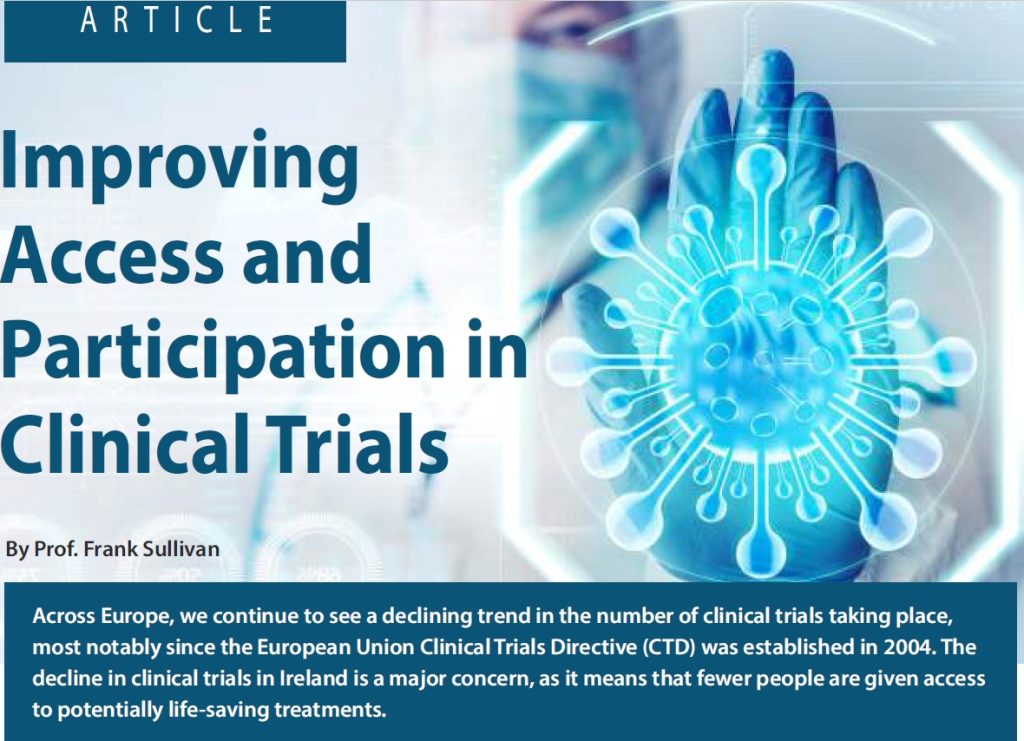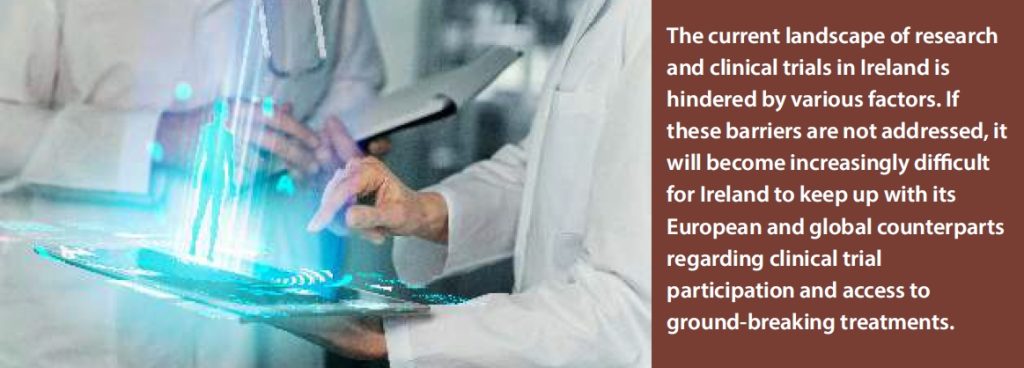
This can have long-term effects on the quality of care being provided, as well as making it harder for new treatments to be developed and tested. However, the CTD has long-felt ramications for European patients. The regulatory burden and insurance requirements grew even more burdensome. At the same time, the global COVID-19 pandemic also affected the number of clinical trials, which decreased by 19.6% in Europe between August and October of 2020 compared to 2019.
However, the effects of this decrease in access to clinical trials are being felt more severely in countries like Ireland which have far fewer trials than their peers. In this article, we explore the causes of decreased access to groundbreaking trials in Ireland and how to improve the quality of health care tocreate a healthier, more efficient system that better serves the Irish population.
Despite Ireland’s significant spend in its healthcare system, diverse population, and heavy inbound investment from the pharma and med-tech sectors, Ireland is not able to keep up with its European counterparts in terms of clinical trial participation.
Current landscape of research in Europe and home in Ireland
Despite Ireland’s significant spend in its healthcare system, diverse population, and heavy inbound investment from the pharma and med-tech sectors, Ireland is not able to keep up with its European counterparts in terms of clinical trial participation. According to the Central Statistics Office (CSO) of Ireland, the foreign direct investment (FDI) in Ireland increased by €109 billion to €1,208 billion in 2021, a large proportion of that coming from the pharmaceutical and med tech sectors. Compared to Finland and Denmark, which both have similar populations and economic wealth, Ireland has only seen 18% of the 2,290 clinical trials conducted between 2013 to 2021 in the three countries. In contrast, Finland and Denmark have respectively seen 29% and 53% of these clinical trials.
Ireland is not alone. The number of clinical trials in the UK has also declined significantly in recent times, with the Association of British Pharmaceutical Industry reporting that the number of industry-backed clinical trials started in the UK each year fell by 41% between 2017 and 2021. This steep drop is due largely to a combination of factors, including slow set-up times, increased staff fatigue and turnover, and a reduction in the NHS’s research capacity. Unfortunately, this means that UK and Ireland is lagging behind many of their European counterparts in attracting clinical trials.
The main barrier for Ireland when it comes to clinical trials is the need for more resources, both in terms of funds and personnel. Clinical trials require a significant amount of time from both researchers and practitioners to be successful. However, due to budgetary constraints, they are often forced to make do with limited personnel or wait for additional funding. Additionally, the infrastructure needed to support clinical trials is often expensive and difficult to obtain.
Another barrier in Ireland is the public’s lack of awareness and understanding regarding clinical trials. Many people are unaware of both their purpose and potential benefits, so they do not see them as a worthwhile investment of time and effort. As such, recruitment for clinical trials becomes more difficult as fewer people are willing to participate. Finally, there is the problem of bureaucracy in Ireland when it comes to starting up clinical trials. It can be a lengthy process that requires navigating complex legal structures and regulatory requirements, which can be challenging and time-consuming, and “off-putting” for established healthcare providers.
A further barrier to trials expansion in Ireland is the lack of digitization and coordination in the health records. Patient records are often still paper based, and fragmented and silo’d, which makes the process of identifying suitable trial candidates difficult, time consuming and expensive. There is urgent need to reform Ireland’s digital health landscape.
Overall, the current landscape of research and clinical trials in Ireland is hindered by these various factors. If these barriers are not addressed, it will become increasingly difficult for Ireland to keep up with its European and global counterparts regarding clinical trial participation and access to ground-breaking treatments.
Dr Rebecca Cramp has been appointed scientific and regulatory affairs manager with the Irish Pharmaceutical Healthcare Association (IPHA), which represents the international research-based pharmaceutical industry in Ireland. She believes that Ireland should be able to attract more clinical trials given the size of its biopharmaceutical manufacturing footprint. To make this a reality, she believes that further standardization in the clinical trials space is needed to help Ireland catch up with Finland and Denmark, and improve its ability to host important studies that give people access to life-saving treatments.

Addressing barriers in current clinical trial system
Bureaucratic impediments: To reverse the trend of declining clinical trials in Ireland, the government has taken steps to address the administrative barriers to clinical trial participation in Ireland. One significant improvement is the centralization of ethics and standardizing the clinical trial process. The National Clinical Trials Office (NCTO) was established to facilitate clinical trial research in Ireland. The NCTO provides a centralized infrastructure to support the set-up and management of clinical trials, including a Clinical Trial Management System (CTMS), which allows researchers to track patient recruitment, trial progress, and data management.
Private-public expansion: Through the Health Research Board (HRB) infrastructure, Ireland has invested heavily in Clinical Research facilities, generally based in and around the public hospital university system, but penetration in the private healthcare delivery system is patchy at best. Up to one half of the Irish population carries health care insurance, and receives some or all of its healthcare in the private system. There is clear scope to expand the pool of patients accessing trials, through measures designed to include all eligible patients, treated in both the private as well as public sectors in Ireland.
Data issues: Finally, there is a clear need to modernize the data infrastructure, to allow for advances in artificial intelligence (AI) and machine
learning to bring further increases in access and retention to clinical trials. We will address this issue here.
Changing clinical trials in Ireland with Whyze Health
Of crucial importance to the issues discussed in the previous section, a significant barrier to clinical trial participation in Ireland is the lack of patient access to digitized personal health records and control over their own medical data. Patients should have access to their medical records and be able to move from one treatment centre to another and to obtain access to trials. This is particularly important for patients with rare diseases, who may need to travel outside their local area to access the best treatments and trials.
The Whyze Health (WH) digital platform provides a solution to this problem by allowing patients to access their personal medical records and connect with their healthcare providers to learn about new treatments and clinical trials. The platform also enables real-time (real-world) monitoring of patients’ conditions, which can help patients and healthcare providers make more informed decisions about treatment options. Furthermore, the platform’s digital asset management system encourages long-term patient participation in trials, providing a unique opportunity for healthcare providers to extend their reach and increase their revenue through research and clinical trial involvement.

Up to one half of the Irish population carries health care insurance, and receives some or all of its healthcare in the private system. There is clear scope to expand the pool of patients accessing trials, through measures designed to include all eligible patients, treated in both the private as well as public sectors.
There are good clinical reasons to promote this activity. Evidence suggests that being treated in a centre where trials are offered is associated with better patient outcomes. Patients who are treated at centres with clinical trials have access to the latest treatments and technologies, which can improve their health outcomes. Better outcomes lead to better value to the overall health sector. Therefore, improving access to clinical trials in Ireland is critical for improving the quality and value of care provided to Irish patients.
The WH platform is designed to unify health and research to advance both knowledge areas. The patient-centered solution encourages patients to connect with their healthcare providers, allowing them access to information about new treatments and clinical trials and real-time monitoring of their conditions. This access is particularly beneficial for those who may not have been previously aware that participation in clinical trials was a viable option, or who had yet to be invited by their healthcare providers.
Increasing the quality of the health interventions through clinical trials improves patients’ outcomes. Improved outcomes lead to improved value to the overall system. Improved value through clinical trials leverages the substantial FDI incoming to Ireland through the pharmaceutical and med tech investments.
In addition to providing resources and information to patients, the Whyze platform also provides a unique opportunity for healthcare providers to extend their reach and increase their revenue through research and clinical trial involvement. Healthcare providers can now link their patients more directly to relevant studies and trials, enabling more people to benefit from state-of-the-art treatments.
Real world evidence driving quality and value in healthcare
In closing, the Whyze Health Platform collects data in a digital health and research data lake that is used for post-market surveillance of medical products, further improving patient outcomes, and increasing the overall quality of the healthcare delivered in Ireland. As new treatments are used in the country, the payers can track the longer term effects of these interventions, to ensure only the best treatments continue to receive financial support. As the platform grows and continues to incentivize patient participation, it can help bridge the gap between high-performing healthcare systems in Europe and their counterparts in America and Asia, allowing patients access to ground-breaking treatments and creating improved health outcomes for all. This amplifies the return on investment Ireland derives from the substantial FDI from pharmaceutical and med tech sectors. Through its unique patient-centred approach, Whyze has provided a much-needed solution to the problems posed by a lack of European access to clinical trials. This is truly the time for a change, and Ireland can rise in the forefront meeting these challenges.
Conclusion
Increasing clinical trials activity in Ireland is a healthcare priority. Direct benefits include improved outcomes and value for the patients and the healthcare system. By products are increase in return on FDI investment for Ireland. Improvements in digital health platforms including AI and machine learning can help drive this important change.
Increasing the quality of the health interventions through clinical trials improves patients’ outcomes. Improved outcomes lead to improved value to the overall system. Improved value through clinical trials leverages the substantial FDI incoming to Ireland through the pharmaceutical and med tech investments.






